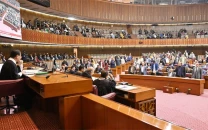Report questions efficacy of US intelligence

Report questions efficacy of US intelligence
In the wake of the attacks, the US government, apart from launching a military invasion of Afghanistan, also spent hundreds of billions of dollars to bolster its counterterrorism readiness.
The newspaper’s investigation found that nine years after the attacks on New York and Washington, the bureaucracy has become “so unwieldy and so secretive that no one knows how much money it costs, how many people it employs, how many programmes exist within it or exactly how many agencies do the same work.”
Among the findings were some 1,271 government organisations and 1,931 private companies working on counterterrorism-related programmes, and 33 building complexes built or under construction to house top-secret work – the same amount of space as nearly three Pentagons or 22 US Capitol buildings.
“There has been so much growth since 9/11 that getting your arms around that – not just for the DNI [Director of National Intelligence], but for any individual, for the director of the CIA, for the secretary of defense – is a challenge,” Defense Secretary Robert Gates told The Post.
The investigation also pointed out the bureaucracy’s magnitude results in enormous redundancy and waste, with homeland security and intelligence programmes carried out in some 10,000 locations across the country.
Fifty-one federal and military commands located in 15 US cities are now dedicated to tracking the flow of money to and from terrorist networks, and with various agencies producing a whopping 50,000 intelligence reports each year, the volume is so large The Post said, that “many are routinely ignored.”
In the Department of Defence, where more than two-thirds of the intelligence programmes reside, only a handful of senior officials – called Super Users – have the ability to even know about all the department’s activities. But as two of the Super Users indicated to The Washington Post, there is simply no way they can keep up with the nation’s most sensitive work.
“I’m not going to live long enough to be briefed on everything,” was how one Super User put it in an interview given to the paper. The other recounted that for his initial briefing, he was escorted into a tiny, dark room, seated at a small table and told he couldn’t take notes. Programme after programme began flashing on a screen, he said, until he yelled ‘’Stop!” in frustration.
“I wasn’t remembering any of it,” he said.
Underscoring the seriousness of these issues are the conclusions of retired Army Lieutenant General John R Vines, who was asked last year to review the method for tracking the Defence Department’s most sensitive programmes. Vines, who once commanded 145,000 troops in Iraq and is familiar with complex problems, was stunned by what he discovered.
“I’m not aware of any agency with the authority, responsibility or a process in place to coordinate all these interagency and commercial activities,” he said in an interview. “The complexity of this system defies description.”
The result, he added, is that it’s impossible to tell whether the US is safer because of all this spending and all these activities.
Gates said that he does not believe the system has become too big to manage but that getting precise data is sometimes difficult. Singling out the growth of intelligence units in the Defence Department, he said he intends to review those programmes for waste. “Nine years after 9/11, it makes a lot of sense to sort of take a look at this and say, ‘Okay, we’ve built tremendous capability, but do we have more than we need?’ “ he said.
Published in The Express Tribune, July 20th, 2010.



















COMMENTS
Comments are moderated and generally will be posted if they are on-topic and not abusive.
For more information, please see our Comments FAQ